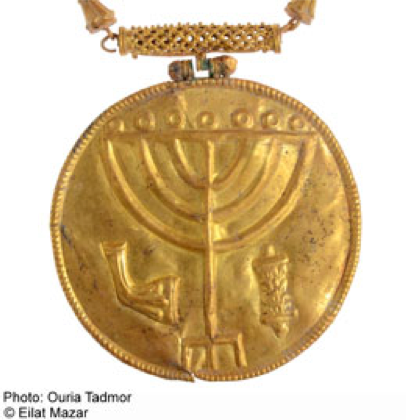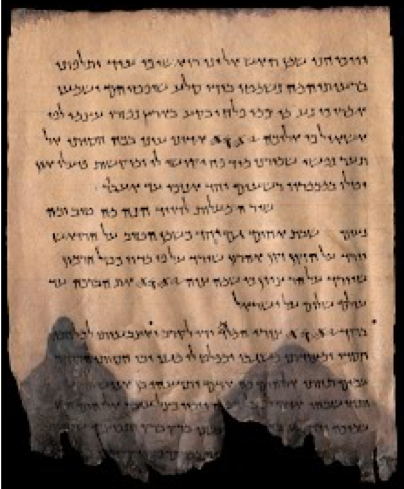Yom Kippur: Unity – Part 3
In part one and part two of this three-part series entitled, Yom Kippur: Unity, we looked at the Holy Day known as Yom Kippur, as well as the symbols and artifacts related to it. In this FINAL part of the series, we will continue to examine artifacts to gain a fuller picture of Yom Kippur and the Jewish roots of the faith. We will discover how Yom Kippur brings unity to the Jewish community. And finally, we will discover how Gentile Believers can benefit from the lessons our Jewish brothers and sisters continue to teach us—as well as the benefits of the Jewish and Christian faiths being brought together.
Symbols Found in Archaeology and History:
The Torah:

While many of the artifacts we have examined are seemingly humble, others are not. Such as the golden medallion found at the southern wall of the Temple Mount.
This gold medallion, which includes a gold chain, is believed to have been a Torah scroll ornament used during the First Temple period. Depicting not only the Torah, but a shofar and a menorah—all common symbols relating to God and Holiness—it would have been a prized display of the reverence and respect of God’s Word and His ways. It is one of the oldest examples of the Jewish people’s connection to Jerusalem and Israel.
“And I will make your descendants multiply as the stars of heaven; I will give to your descendants all these lands; and in your seed all the nations of the earth shall be blessed; because Abraham obeyed My voice and kept My charge, My commandments, My statutes, and My laws.”—Genesis 26:4-5
Finally, one of the most famous archaeological finds in the world worth examining are the Dead Sea Scrolls. These segments of Torah, including previously unknown portions, were found hidden in clay jars in high caves near the Dead Sea. Discovered by a Bedouin shepherd throwing rocks into a cave entrance in 1947, these scrolls are prized not only by the Jewish community, but by various faiths and academic professionals the world over.
Yet, of these scrolls, the Psalms Scroll, particularly the scroll containing Psalm 133, is very relevant to Yom Kippur—a day on which Jews the world over unite together for prayer, fasting, repentance, and of course, the reading of the Torah. It is a day of unity for Abraham’s children, one that is pleasing to the Lord.
“Behold, how good and how pleasant it is
for brethren to dwell together in unity!
“It is like the precious oil upon the head,
running down on the beard,
the beard of Aaron,
running down on the edge of his garments.
It is like the dew of Hermon,
descending upon the mountains of Zion;
for there the Lord commanded the blessing—
Life forevermore.”—Psalm 133:1-3

What is the point of Yom Kippur? What is the takeaway?
Unity:
Despite the focus of Yom Kippur being repentance and redemption, unity is perhaps the central force behind this. Unity with God, with His laws, His commandments, and His ways. Yet, the importance of unity doesn’t stop there—it begins.
Those going to the synagogue ask not only for their own forgiveness, but for the redemption of their families, community, their people and country. Each individual enters the synagogue as emissary for the entire Jewish people and pray divine blessings for the entire world!
This unity and worldview is seen in a commonly spoken prayer on Yom Kippur:
“By the authority of the Heavenly Court, and by the authority of the earthly court, with the permission of God and by the permission of this congregation—all agree that on this day, there are no differences between Jews. They all stand united on the ‘one day of the year’ in the presence of the one God.”
Examples of the Unity on Yom Kippur:
- Unity among the people of God with fasting and prayer
- Unity brought on by one central focus—God
- Unity bringing the people into one accord with one another and with God
- Unity in love—love for one another, as one loves themselves, through action and word
“Therefore if there is any consolation in Christ, if any comfort of love, if any fellowship of the Spirit, if any affection and mercy, fulfill my joy by being like-minded, having the same love, being of one accord, of one mind.”—Philippians 2:1-2
“For where two or three are gathered together in My name, I am there in the midst of them.”—Matthew 18:20
This unity is a powerful thing. God is love, and unity is the embodiment of love. Where love and unity reside, God WILL move mightily!
What We Can Learn From Our Jewish Brothers and Sisters:
There are many things we can learn from the lives of our Jewish brothers and sisters. Yom Kippur is one observance we can share to draw us closer to God and His blessings.
Some of the benefits include:
- Reverence of God’s Word
- A desire to be in right standing with God
- Acceptance of the need for Godly judgment and repentance—not man’s judgment
- Unity—with God and man
- The understanding that without God man is nothing—He is the redeemer
- Desire for those around us to prosper with God
- The importance of self-examination
- Corporate prayer
- Corporate fasting
- Corporate repentance
- Corporate examination of the community—asking for forgiveness for the sake of the community, even if not personally involved in the iniquity
- Study of the Word
While religious additions to Jewish, Christian, and even One New Man walks have tainted many of God’s laws and commands, that doesn’t mean we are to forsake them entirely. God commands in His Word for us to observe certain days of the year for varying reasons, and while the Blood of Jesus removes the punishment of not observing them, there are still blessings which can only be found through observance. It is up to each of us to seek God and ask if we are to follow our Hebraic roots of the faith, or not.
The blessings of Yom Kippur—or at least, those we expect would come from its observance—we do indeed have by the Blood, such as, the forgiveness of sin. Yet, corporate prayer, corporate fasting, and corporate repentance, all allow the glory of God to flow through us. God WILL listen to us when we are alone, but the Word says that where WE are gathered in His name, He will be there. Unity is perhaps one of the greatest blessings found through the observance of Yom Kippur, and what better time to be in unity than a time God commanded long ago for us to gather together and repent.
“‘Now, therefore,’ says the Lord,
‘Turn to Me with all your heart,
with fasting, with weeping, and with mourning.’
So rend your heart, and not your garments;
return to the Lord your God,
for He is gracious and merciful,
slow to anger, and of great kindness;
and He relents from doing harm.”—Joel 2:12-13
